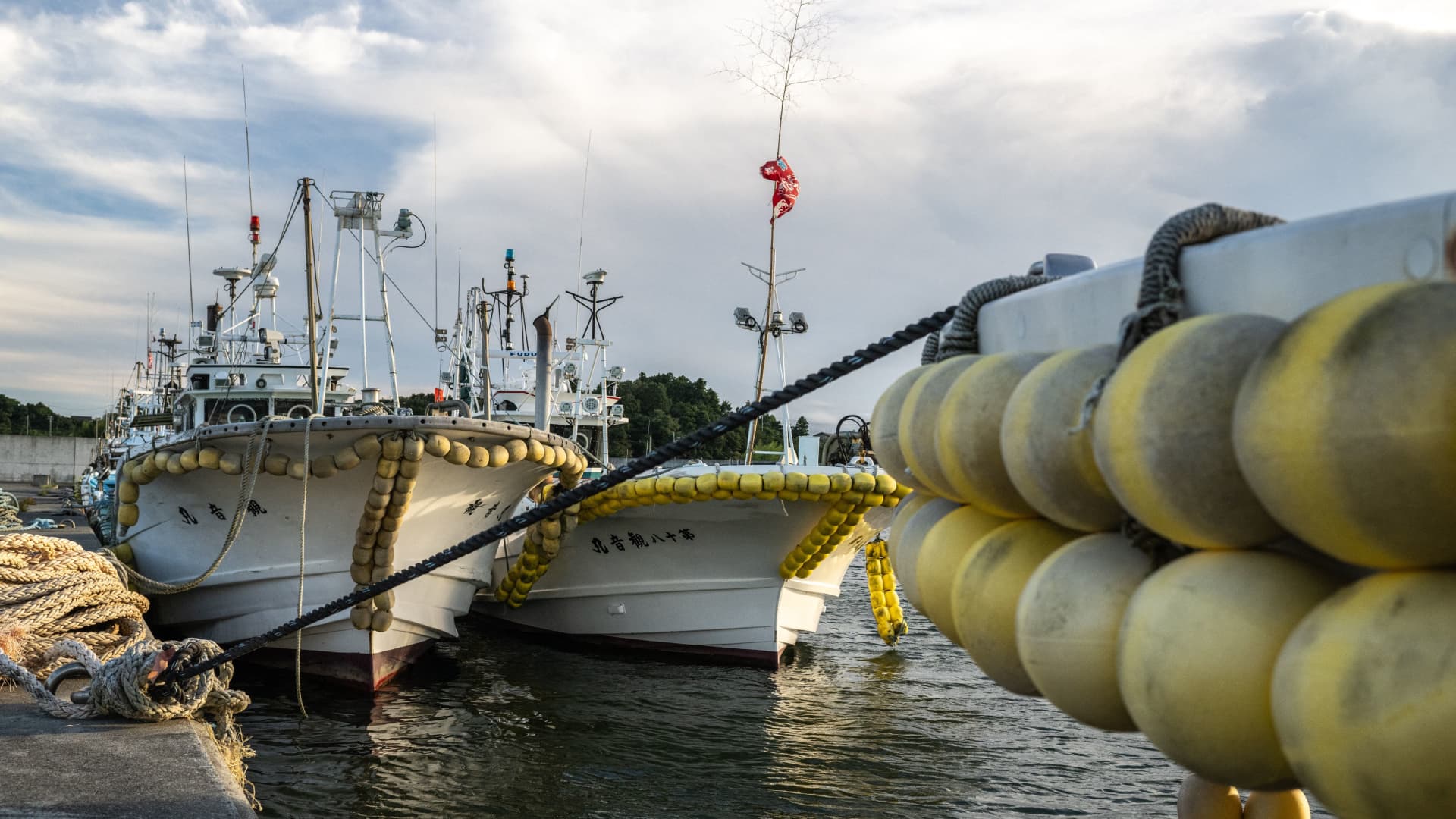The fishing boats of Haruo Ono, a fisherman, are photographed at Tsurushihama Fishing Port in Shinchi-machi, Fukushima Prefecture, which is approximately 60 kilometers north of the devastated Fukushima Daiichi nuclear plant, on August 21, 2023.
Source: Philip Fong | Afp | Getty Images
Japan is set to release a significant amount of treated radioactive water from the tsunami-ravaged Fukushima nuclear power plant into the Pacific Ocean. This move has sparked intense controversy and criticism from neighboring countries.
This water release comes more than ten years after Japan experienced the second-worst nuclear disaster in history. In March 2011, a massive earthquake and tsunami destroyed the Fukushima nuclear power plant, which is located on Japan’s east coast, about 250 kilometers northeast of Tokyo.
Japanese Prime Minister Fumio Kishida announced earlier this week that the country plans to discharge approximately 1.3 million metric tons of treated wastewater, equivalent to about 500 Olympic-sized swimming pools, from the crippled Fukushima power plant into the sea starting on Thursday, subject to weather conditions.
Japan’s government has consistently stated that the release of treated water is safe, and the United Nations’ nuclear watchdog has supported this decision. The International Atomic Energy Agency declared in early July that Tokyo’s plans comply with international standards and will have a “negligible” impact on people and the environment. The process is expected to take several decades to complete.
However, neighboring countries are far from pleased.
Japanese Prime Minister Fumio Kishida (C) speaks during a meeting with representatives of the Inter-Ministerial Council for Contaminated Water, Treated Water and Decommissioning Issues and the Inter-Ministerial Council Concerning the Continuous Implementation of the Basic Policy on Handling of ALPS Treated Water, at Prime Minister’s Office, on August 22, 2023, in Tokyo, Japan. (Photo by Rodrigo Reyes Marin/Zuma Press/Pool/Anadolu Agency via Getty Images)
Source: Rodrigo Reyes Marin | Zuma Press | Pool | Anadolu Agency | Getty Images
Local fishing groups and UN human rights experts have expressed concerns about the potential impact on the marine environment and public health due to the water release. Campaigners argue that not all possible consequences have been thoroughly studied.
Japan argues that the release of filtered and diluted water is a necessary step in decommissioning the plant and that a prompt solution is required as the storage tanks holding the treated water will soon reach their capacity.
Regionally, China has emerged as one of the strongest opponents to Japan’s plans.
‘Extremely Selfish and Irresponsible’
On Tuesday, China’s Foreign Ministry Spokesperson Wang Wenbin accused Tokyo of being “extremely selfish and irresponsible” for proceeding with the disposal of the water. Wang emphasized that the ocean should be regarded as a common asset for humanity, not a dumping ground for Japan’s nuclear-contaminated water.
“China strongly urges Japan to halt its wrongdoing, cancel the ocean discharge plan, engage in sincere and goodwill-based communication with neighboring countries, responsibly dispose of the nuclear-contaminated water, and accept rigorous international oversight,” Wang stated at a press conference.
A spokesperson for Japan’s Embassy in London did not respond to CNBC’s request for comment.
Hong Kong’s Chief Executive John Lee also voiced strong opposition to the release of wastewater from the Fukushima power plant. In response to Japan’s announcement, Hong Kong imposed import restrictions on certain Japanese food products.
South Korean protesters participate in a rally against the Japanese government’s decision to release treated radioactive water into the Pacific Ocean on August 22, 2023, in Seoul, South Korea.
Source: Chung Sung-jun | Getty Images News | Getty Images
South Korea, while occasionally expressing regional support for Japan, stated that it sees no scientific issues with the plan to release the treated water. However, in a statement released on Tuesday, the government clarified that it does not necessarily agree with or endorse the plan.
Earlier this month, hundreds of activists in South Korea gathered in Seoul to protest against Japan’s intention to dispose of the treated water in the ocean.
Both China and South Korea have implemented bans on fish imports from the Fukushima region.
‘A Total Non-Issue’
Nigel Marks, an associate professor at Curtin University in Perth, Australia, explained that the Fukushima water issue is primarily related to tritium, a naturally-occurring radioactive isotope of hydrogen released during the regular operation of nuclear power plants.
“Tritium releases far higher than those planned at Fukushima have been occurring for about sixty years without any safety incidents,” Marks stated in an email to CNBC.
He continued, “From a radiation safety perspective, tritium is essentially harmless, which raises the question of why the Fukushima water has become such a public relations nightmare. The average person is unaware that their own body contains radioactivity, nor do they have a sense of the scale of what constitutes significant radiation exposure.”
“That is why the issue of Fukushima water is ultimately inconsequential—there is already a small amount of tritium present around us, which is harmless, and the additional minuscule amount will have no significant impact,” Marks concluded.
Fishing groups in Japan, South Korea, and the Philippines have criticized the release of treated water from the nuclear plant, expressing concerns about the potential effects on regional resources and the livelihoods of coastal communities.
Environmental campaign group Greenpeace’s analysts expressed their deep disappointment and outrage at Japan’s decision to release treated radioactive water into the Pacific Ocean. Shaun Burnie, a senior nuclear specialist at Greenpeace East Asia, called it an outrage that violates the human rights of the people and communities of Fukushima, as well as neighboring prefectures and the wider Asia-Pacific region.
Denial of responsibility! VigourTimes is an automatic aggregator of Global media. In each content, the hyperlink to the primary source is specified. All trademarks belong to their rightful owners, and all materials to their authors. For any complaint, please reach us at – [email protected]. We will take necessary action within 24 hours.


